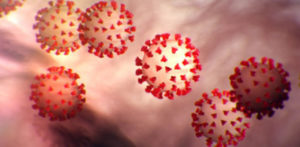 By James Loftis, Policy Intern
By James Loftis, Policy Intern
Shortly after news first broke on the outbreak of a novel coronavirus within the city of Wuhan in central China, conspiracy theories focused on the origin of the virus began popping up on social media feeds in the United States. The conspiracy theories and accusations that followed underscore the need for leaders around the world to increase transparency and accountability surrounding both biodefense programs and the biotech industry.
As Covid-19 conspiracies penetrate deeper into the public discourse, it will be to the detriment of our national response, and the public’s trust in government agencies responsible for organizing it. This should not have come as a surprise. A review of the U.S.-led international response to the 2014-2015 Ebola outbreak already demonstrated that misinformation and unreliable public messaging can be key drivers of a deadly disease. The United States ignores that lesson at its own peril. The problem is compounded when national leaders themselves voice unfounded accusations to attack other nations and endanger American citizens.
On February 2, less than a month after scientists first officially identified Covid-19, the World Health Organization declared that there was a “massive infodemic,” citing the rapid spread of misinformation alongside an overabundance of sources. One of the most widely circulated false claims is that Covid-19 is a man-made biological weapon released either intentionally or on accident. In an early attempt to counter the effect of these false stories, the World Health Organization began working closely with major tech firms such as Google, Facebook, and Twitter to actively filter out misinformation on coronavirus from their platforms. These combined efforts have had some success, but are rendered somewhat ineffective when legislators and high-ranking government officials traffic in the same dubious information.
During a Fox News interview in mid-February, Senator Tom Cotton (R-Arkansas) argued the United States needs to confront China’s government over whether Covid-19 is linked to the Wuhan National Biosafety Laboratory. This laboratory researches some of the world’s most dangerous pathogens for the purpose of developing effective treatments and protections against them. It also features prominently in repeatedly debunked conspiracy theories which claim its true function is weaponizing infectious diseases for later use by China’s military. However, as Senator Cotton noted over the course of that same interview, the United States has “such laboratories ourselves…run by our military, in large part done for preventative purposes.”
Disease experts have long worried about the possibility of an accidental release of a deadly virus from the high-security labs designed to study them. Continued attention from expert groups has helped pressure countries to adopt precautions that lower the chance of such an outcome.
While debate about the exact origin of the virus will continue, a multinational team of top scientists have concluded that Covid-19 appears to be a naturally-occurring disease, and that there is no evidence to support theories that the virus is a man-made bioweapon.
Sen. Cotton’s remarks seemed purposefully aimed at using existing fears to create new fears. Posing vague and open-ended questions about the possibly nefarious origins of Covid-19 to the public is reckless. It also grants unnecessary validity to counter-accusations.
In mid-January, U.S. officials identified a coordinated disinformation campaign involving thousands of Russian-linked social media accounts making near-identical posts claiming that Covid-19 is a biological weapon manufactured by the US Central Intelligence Agency in order to “wage economic war” against China and humiliate the Chinese government. More recently, on March 12, Zhao Lijian, a spokesperson for China’s Ministry of Foreign Affairs, wrote that “it might be the US army who brought the epidemic to Wuhan.”
As leaders exchange accusations, the fundamental, and unaddressed challenge of biological research (and the source of continuing conspiracy theories) is laid bare. Both China and the United States possess the infrastructure and technical expertise to mass-produce biological warfare agents, and both countries have declared ongoing research on deadly pathogens for the purposes of national defense. The United States is known to operate at least 15 such labs, and, according to open source reporting, China has just the one facility at Wuhan. Due to the widely recognized potential for biowarfare activities, the existence of these facilities naturally breeds suspicion. Leaders in these countries should be trying to reduce those suspicions, not exacerbate them.
Pointing fingers will do nothing to stop the spread of Covid-19. Even if the governments of China and Russia continue to peddle false conspiracies, the United States should not follow suit. An effective global response to this pandemic will rely upon disciplined cooperation between and among nations. The United States should strive to be a leader — not an antagonist — in that process.
Weakened from the outset by eroding confidence in public health authorities and a neglected response system, efforts to combat the domestic spread of coronavirus demand that our national leaders unify and provide Americans with information that helps them moderate their fears and adapt to countermeasures necessary to fight against the disease. Disseminating unsubstantiated claims that Covid-19 is a Chinese bioweapon serves neither objective, and threatens to divert attention away from areas where it is urgently needed to address the ongoing public health crisis.
Once the Covid-19 crisis has come under a greater measure of control, the United States should undertake a comprehensive review of its National Biodefense Strategy. The review should focus on the strategies that proved effective, those that need to be strengthened, and those that need to be abandoned. Among other major considerations, this review should seek ways to better counteract disinformation about both naturally-occurring and man-made biological threats in the future. At the core of this effort should be a renewed push to increase transparency surrounding both biodefense programs and the biotech industry. Such an endeavor could also reinvigorate attempts to create a comprehensive verification regime for the Biological Weapons Convention. It is through positive efforts like these, rather than scapegoating and unsubstantiated accusations, that we will better manage the next global health crisis.
